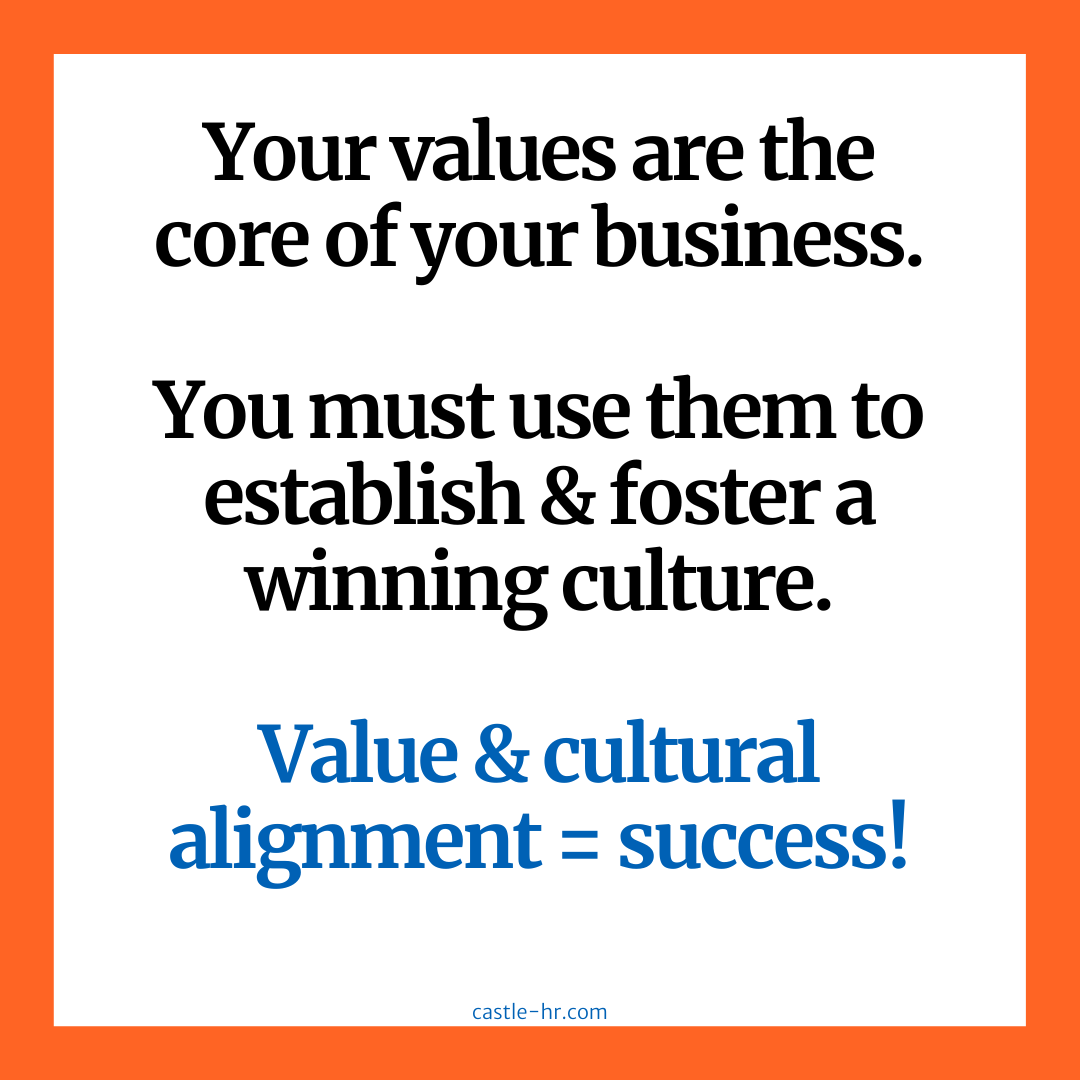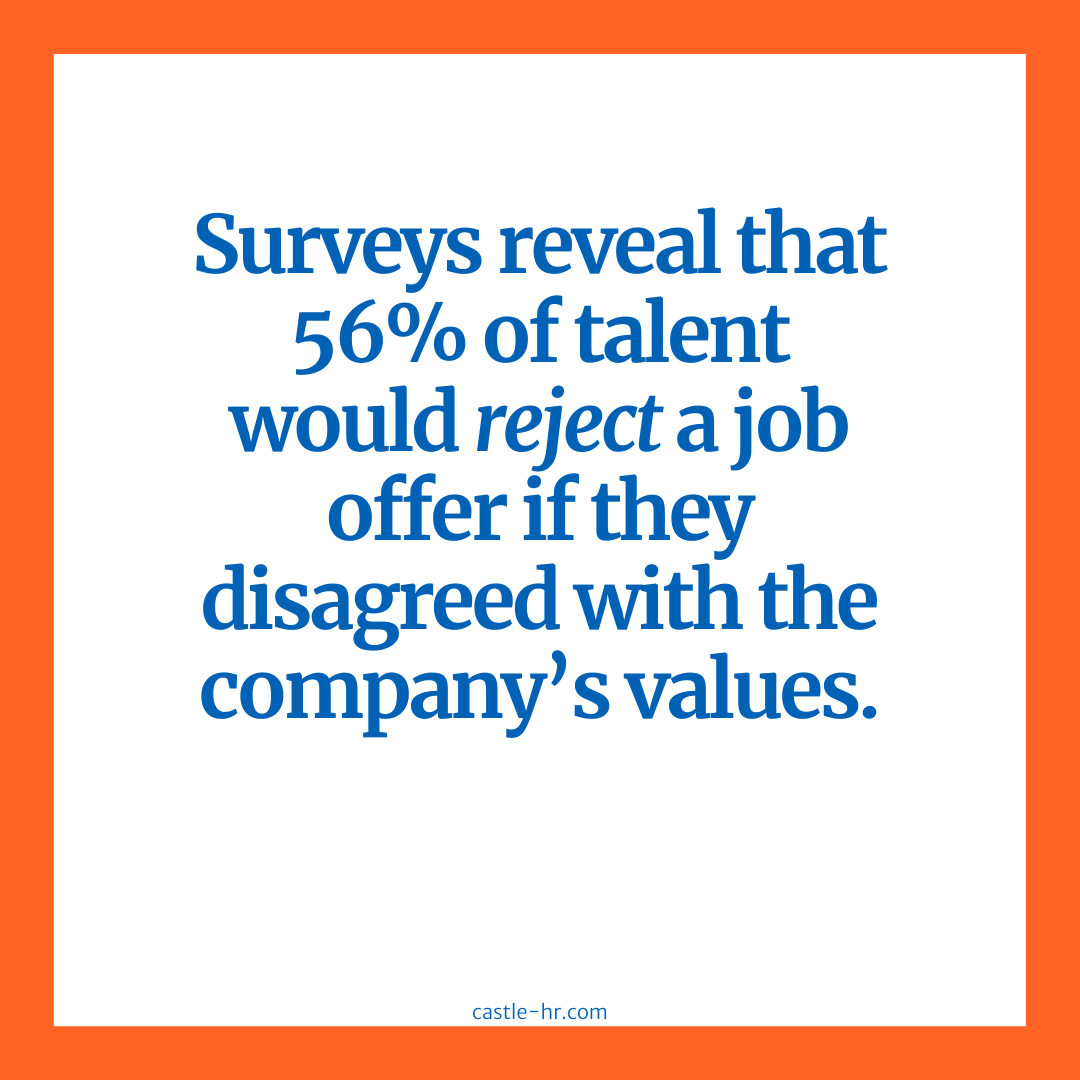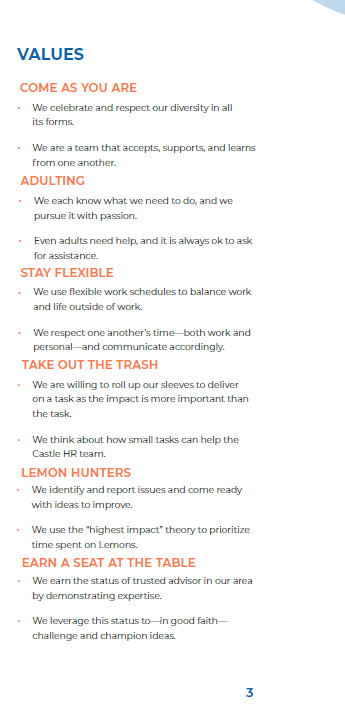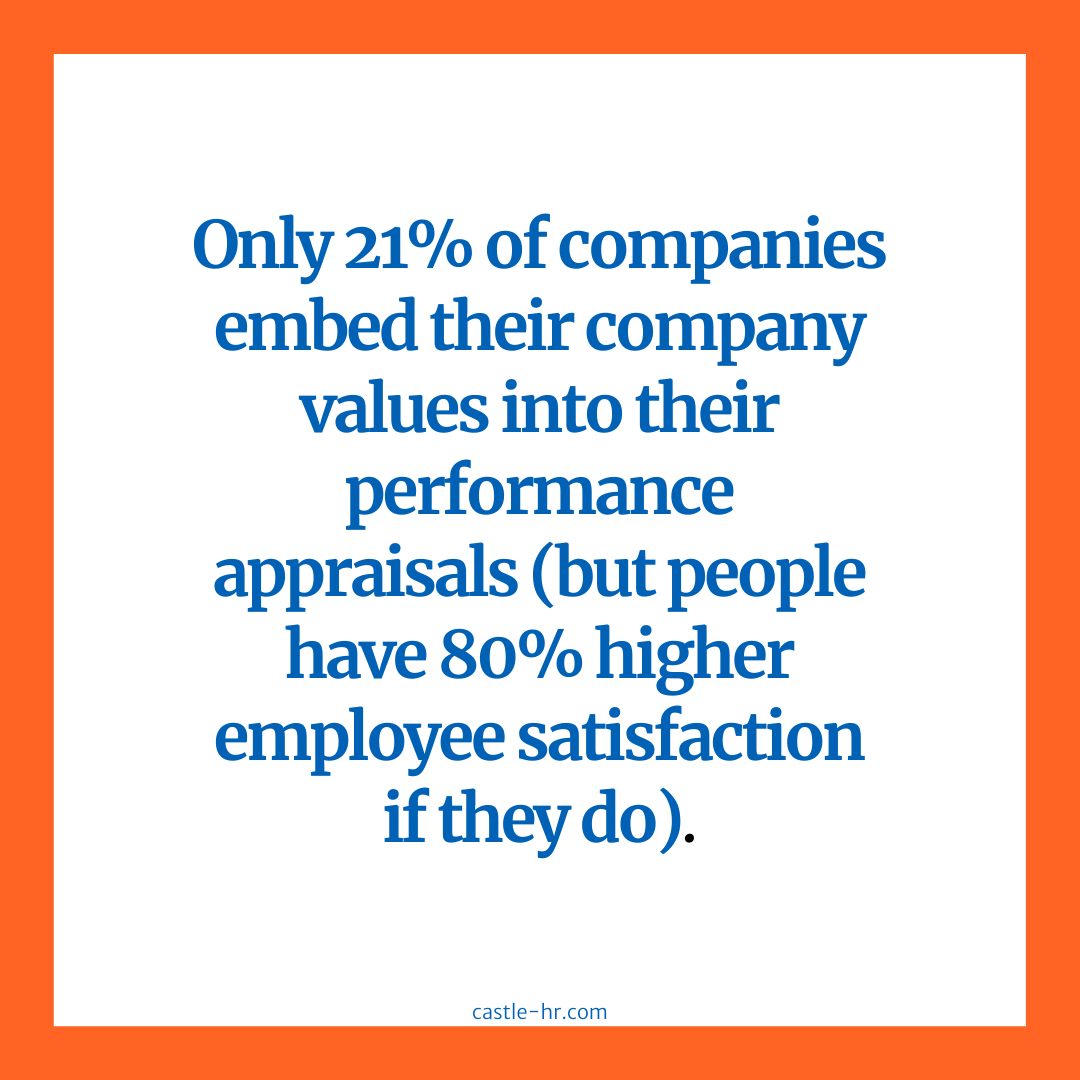If you don’t define your company values and culture, your team will define them for you.
Value and culture alignment are the key(s) to building an aligned team that achieves great success!
So, what we’re saying is, ultimately, your vales and culture can make or break your business…don’t leave them in the hands of your team!
Instead, business leaders should strive to establish firm values that speak to their company’s mission, demonstrate and incorporate them, cultivate a company culture based on these values…and continuously maintain it as their team expands.
When you have a firm set of values and begin to see them in action (when they evolve into virtues), you’ll find that fostering your company culture becomes seamless.
 Yes, this is a lot of work, but it is worth investing your time and energy – it won’t happen overnight, but having a solid foundation as you begin to scale will pay dividends.
Yes, this is a lot of work, but it is worth investing your time and energy – it won’t happen overnight, but having a solid foundation as you begin to scale will pay dividends.
When you’re confident in your company values, you can establish strategies and repeatable processes through their lens.
This means you’ll be able to make better hiring decisions; productivity and retention will improve when you have a team of aligned A-Players.
But, your values aren’t merely established once you’ve written them down on paper – just as your company culture won’t become evident if you place a ping-pong table in your breakroom or treat your team to lunch each month.
When it comes to values and culture, it’s all about action.
Your values will serve as the guiding principles that drive actions, shape your company culture, and, ultimately, determine your success.
Keep reading to learn all about company values and culture and what steps you can take to establish and maintain them!
What are company values?
Company values are principles or beliefs that will guide your organization’s behaviour, decisions, and actions. Your values are the heart of your business. They define what you stand for and what kind of behaviour you expect from your team.
Values guide every aspect of your business, from crafting the mission statement to making decisions in day-to-day operations.
When defining your company’s values, consider what makes your organization unique and what you want to be known for.
 Additionally, it’s important to remember that your company values are more than just words written on your office wall is crucial as your company scales.
Additionally, it’s important to remember that your company values are more than just words written on your office wall is crucial as your company scales.
Sure, you should formalize your values and share them with your team. But demonstrating and embodying these values is the key to your success…and creating and fostering a strong culture.
At Castle HR, we believe values are an essential part of our business and emphasize the importance of values to each of our clients. We strive to embody our values in all we do and encourage other leaders to do the same.
We run a values exercise with each of our clients – it’s one of the first things we do.
Understanding your business identity, mission, and goals will help you be able to define your values if you haven’t done so already!
When values are aligned with the company’s mission and goals, they can also help to attract and retain employees who share the same values and beliefs. This can help you build a winning team of A-Players, which will only help your business prosper!
What are virtues?
Virtues are the embodiment of your company values in action.

Values are the principles or beliefs that guide our behaviour and decision-making; when you and your team act and operate through the lens of your values, they will become virtues.
Virtues are the positive qualities or characteristics we strive to cultivate based on our values.
An example of values becoming virtues might be a company that values teamwork and collaboration.
When it becomes second nature for your team to work together and support each other to achieve common goals (i.e., they take the initiative to work collaboratively without requiring direction), they embody the virtues that align with the company’s values.
These virtues, in turn, can lead to increased productivity, innovation, retention, and a strong company culture.
Why must you define your company values?
Having a clear sense of direction can help your team operate efficiently and head down a path to success. The key to achieving this is having a defined set of values, building a team that aligns with them, and establishing processes and materials, such as your employee handbook, through the lens of your values.
With a defined set of values, accomplishing your goals can be smooth. Great values can positively impact your business in many ways:
Values promote winning behaviours
Values provide a clear standard for how your team should behave and interact with each other and serve as a benchmark for performance.
By establishing values that align with your company’s mission, you’ll create a culture that inspires and motivates your team to achieve greatness.
Values help you and your team make decisions
When faced with a tough choice, having a set of values to refer to can make the decision-making process much more straightforward.
Following your values ensures all decisions align with your company’s mission and priorities. And, when your team is used to demonstrating your company values, making important decisions through the lens of your values will become second nature.
Values can positively impact talent acquisition
Values and talent acquisition go hand-in-hand! Following EOS Traction’s ‘Right People, Right Seats’ concept, we firmly believe in using your company values to establish who your ideal candidate is.
‘Right People’ refers to team members aligning with your company values and culture. When people effortlessly fit into the team’s culture, you’ll know you have optimal value alignment.
When you craft components of your talent acquisition strategy – such as your job description and interview scorecard – you’ll want to incorporate your values and communicate what exactly you’re looking for in a candidate based on them.
Additionally, candidates will be drawn to companies with a strong sense of purpose and culture.
Getting the Right People in the Right Seats can be difficult without a firm set of values. While an impressive resume may be intriguing, hiring the right person for a role goes beyond workplace experience and skillset!

Value alignment = improved retention
When your values are an integral part of your talent acquisition process, you’ll be more likely to make better hiring decisions that will result in better retention rates.
When your team feels they align with your values and have a sense of belonging, they won’t look elsewhere.
Value alignment is prioritized and highly important to today’s workforce!
What can be done to maintain your company values
Defining your company values is one thing, but bringing them to life, incorporating them into your everyday actions and maintaining them is another.
Once you have your company values defined – whether single words or phrases unique to you- you’ll be able to establish other processes and operate in ways that demonstrate your values.
As we stated earlier, values are meaningless without action, so demonstrating your defined values in all that you do is essential.
As a business owner, you can create a culture centred around your values, which will help drive success, employee engagement, and even customer satisfaction; but that requires ongoing action. Here is how you can maintain your company values as your business continues to expand:
Communicate and Codify

One way to bring your defined values to life is by codifying them in your custom employee handbook.
This communicates your values to your team and holds them accountable.
Additionally, communicating your values to employees through regular company-wide meetings, emails, or even daily conversations can keep them at the forefront of everyone’s minds.
Here, you can see our own company values as they appear in our employee handbook.
We used C.A.S.T.L.E as an acronym to craft our values.
…having memorable values makes them easier to align with and understand!
Recognition
Acknowledging that people are demonstrating your defined values will help affirm exemplary behaviour, and solidify your values for remote and in-person teams.
At Castle HR, we run quarterly town hall meetings where we review our values by sharing photos and specific examples of moments when our team members have demonstrated them. Many of these examples are derived from our Slack channel, where our team is encouraged to share stories and communicate.
Check-In
Another way to demonstrate your values is by ‘checking in on them’; a great approach to this is, integrating them into your Modern Performance Reviews.

Embedding your values into your routine performance reviews can help you accurately assess culture and value alignment. This ensures everyone is on the same page and working towards a common goal. You may also wish to consider sending out surveys throughout the year to gauge how your team understands and demonstrates your values.
Continuously Incorporate
Finally, to help your talent acquisition and retention efforts, you should incorporate your values into your job postings, interview scorecards, and any other materials, content, and processes you share with your team. This will help attract like-minded individuals to your organization and help you get the right talent through your door, and it will help you retain that talent longer!
Values are not just words written on a wall; what you and your team do to exhibit and embody those values matters most.
They are a powerful tool for shaping your company culture and driving success.
By defining your values and continuously demonstrating them by communicating them, providing behaviour recognition that aligns with them, checking in on your team and incorporating them in all of your processes, you can bring them to life and create a thriving company culture.
What is company culture?
Your company culture is the very essence of your organization, dictating how your employees interact, behave, and contribute to the success of your business. Think of it as the foundation of your company!
Values are the heart of an organization, and culture is the soul. Culture is the shared values, beliefs, attitudes, and behaviours that define how people work together towards a common goal. It shapes the overall working environment and creates a sense of community.
As we stated earlier, building a winning, thriving culture cannot be achieved without a defined set of values that your team embodies.

A strong company culture is essential to any business’s success; it takes more than placing a ping-pong table in your breakroom or hosting a team lunch every month to foster it continuously.
…company culture requires ongoing attention. Actions speak louder than words!
Why is company culture important?
A strong culture helps you ‘win’ across many fronts and keeps everybody aligned and moving in the same direction; this will help you meet and exceed your goals and, ultimately, achieve great success as your business grows.
When defined and fostered by leadership, a winning culture attracts top talent, boosts retention, and improves decision-making. It also helps foster an atmosphere of collaboration and creativity in the workplace.
It can help you ensure that you have the ‘Right People’ in the ‘Right Seats’ and that your team can function without constant guidance.
Bearing all of that in mind, let’s take a thorough look at what a winning culture can accomplish at your business and why it’s so important:
Attract Top Talent
Investing time and resources into developing a winning culture enhances your reputation as an employer of choice.
A positive work environment can draw skilled workers looking for a place where they feel valued, inspired and rewarded. By creating an atmosphere that encourages people to perform their best and reach their career goals, you can attract top talent who will help grow your business.
Much of today’s workforce values culture above all else. With a strong culture and excellent reputation, you’ll be able to attract the best of the best, whether they come from job boards or through your Employee Referral Program.
Retention
Today’s workforce highly values culture. Fostering a winning culture will help you attract great people…and retain them.
Top talent will stay with you longer when they align with your company culture and feel they can be themselves in the workplace. When people are happy in their roles, know which direction they’re heading in, and feel supported by a strong culture, they won’t look for work elsewhere.
Decision-Making Tools
A strong culture provides leadership with powerful decision-making tools like clear communication standards and trust in the team’s abilities.
It’s impractical to assume that leaders (like yourself) will be available constantly and continuously – and you shouldn’t have to be. With a winning culture and a team that aligns with it, you’ll have peace of mind knowing that you can trust people to make decisions and conduct themselves to reflect your company’s values and culture without guidance.
What happens to businesses without a winning culture?
Without a defined, winning culture, businesses will struggle to hire and retain the ‘Right People.’
They’ll also put their business at risk in many ways…high turnover, their team won’t be able to make decisions and function without guidance, toxic team environments, and more.
And, as we always say…
Business owners need a strong belief that they can create an environment built on success by investing in their team’s potential and inspiring them to reach beyond their comfort zones!
What can be done to maintain your company culture?
Leading a successful company isn’t just about numbers – doing so requires building and maintaining an inspiring work atmosphere with a culture that encourages innovation and productivity. Everyone on your team should feel valued and respected for their contributions.
With that said, it’s essential that you continually foster your culture for it to flourish for years to come – and that requires attention and dedication!
Here are some ways you can maintain your culture:
Always reference and acknowledge your values
There’s a saying that goes, ‘It’s not what you say – it’s what you do’ – this is relevant when it comes to your winning culture and your company values.
Values are meaningless without action, so you must reward and acknowledge behaviours that align with your values and take action to correct any conduct that does not!
Additionally, any important decisions you make should be made through the lens of your values.
This means that your values should impact and guide your actions internally and externally, from how you operate to what clients you work with.
For instance, if you’re working with a client who does not align with your values, you can consider ‘firing’ them if it makes sense. Your entire team will be expected to make decisions with your company values in mind, and as their leader, you must always do the same!
Hiring the ‘Right People’
As we’ve mentioned a few times, you must strive to put the ‘Right People’ in the ‘Right Seats’ as often as possible – this can ‘make or break’ how you maintain your culture!
When recruiting new employees, look for candidates who align with your company culture by assessing their attitudes, beliefs and skill sets against your established core values.
Keeping these criteria in mind during all stages of recruitment will ensure that each addition you make brings positive energy into the workplace – this will also decrease your turnover rate in the long run.
When you can make confident decisions and hire talent that aligns with your culture, they’re more likely to stay with you longer!
Use culture as a KPI
Gone are the days of a top-down approach to culture – culture is everyone’s responsibility – and employees at all levels must be held accountable for demonstrating appropriate behaviour and adhering to cultural expectations.
That is why using culture as a key performance indicator (KPI) can help you track how well your organization is maintaining its desired culture. It can also help you look at your culture on an individual level.
For instance, you may wish to measure employee engagement and turnover rates to get a sense of your culture’s impact. You can also introduce periodic surveys or focus groups for employees to provide feedback on the current state of affairs within the company.
Additionally, you must remember that good performance isn’t indicative of cultural alignment.
Let’s say you have an employee on your team who tends to act like a ‘jerk salesperson’ or exhibits toxic traits…
This person may perform well and do their job, but if they aren’t aligning with your culture and don’t demonstrate your company values, they’ve got to go. Just as you have a sales KPI, you should also have a culture one.
In instances like this, you should address the issue to uphold your values and maintain your company culture; this may very well be a case where termination makes sense!
Culture is everyone’s responsibility, but you must set a prime example as a leader!
What is toxic company culture?

A toxic company culture is one in which employees feel unsupported, unappreciated, and disrespected.
It is characterized by negative behaviours such as bullying, harassment, micromanagement, and favouritism. In a toxic workplace, employees often feel like they are constantly walking on eggshells, afraid to speak up for fear of retribution or retaliation.
This can result from poor leadership, planning and/or communication… or even a single hire who doesn’t align with your values, culture and mission.
For example, negative behaviours, such as gossip or bullying, that leadership does not address adequately can lead to a toxic environment.
The effects of a toxic culture can be far-reaching, impacting not only employee morale and job satisfaction but also overall business performance.
What happens to workplaces with a toxic culture?
As you can probably imagine, cleaning up a culture mess in motion can be challenging. And it doesn’t take much for one employee to damage the culture you’ve built.
When you don’t hire based on your values and continuously strive to foster and maintain a winning culture, you’ll notice that the following can happen:
- Hiring and retaining people becomes harder
- Bad reputation
- Low morale
- Low productivity
- Absenteeism (from work and work-related events, like Holiday parties)
- Decrease in revenue
- Increase in burnout among team and leaders
- Competitive or negative mindsets
- Potential lawsuits (for mishandled situations such as harassment or poorly executed terminations)
As stated in the section above, culture should be one of your KPIs! No matter how well they perform, it isn’t worth risking your company culture if people don’t align. It can take years to repair this kind of damage.
Adhere to your values at all times and build a team of true A-Players!
Is there a specific type of company culture?
…Spoiler alert – there are 8 types of company culture!
This doesn’t mean you’re destined to identify with a single culture type and stick to it, though.
Many businesses identify with more than one culture type, so companies will often consider themselves to be a ‘combination’ of 2-3 culture types.So, what ‘types’ of culture resonate with you and your business?:
Caring: These companies pride themselves on taking care of their team. They often have extensive benefits packages and are very focused on work/life balance and employee collaboration. The downside of a caring culture is that it may be seen as a ‘coddling’ culture by some, and they may not be as driven to achieve results.
Purpose: Companies with a purpose-culture exist to achieve a greater good, not just to make money. They are often mission-driven and values-based, which also extends to their team’s mindset! The purpose driving the company is often essential to employees and unites an entire team. If there’s any potential ‘con’ to a purpose-driven culture, it is that they can be overly idealistic and may have difficulty making tough decisions.
Learning: These companies believe learning is lifelong and invest heavily in employee development. They are often very open to new ideas and adapting new (or altering) practices. Some may suggest that teams who embody a learning culture may be ‘flighty’ or not as results-driven, but this is subjective and depends greatly on leadership!
Enjoyment: Companies with an enjoyment-culture value fun in the workplace. They often prioritize comfortability and have a very informal structure; they typically encourage employee creativity, flexibility and collaboration. Although a more playful work environment sounds appealing, it has been suggested that employees may not take their work seriously if there aren’t clear boundaries and expectations.
Results: These companies focus on achieving results and often have a competitive environment. The upside of these cultures is that they aim to be highly productive and can achieve great results. The downside is that they can be very stressful and less conducive to employee development. Decisions may also be made unilaterally, as many results-oriented companies opt for a hierarchical structure.
Authority: Authoritarian companies believe in a top-down approach to management and often have a very hierarchical structure. The benefit of an authority-style culture is that they are very efficient and decisions are made quickly. Unfortunately, they have the potential to be inflexible and may not be as open to new ideas or encouraging employees to think outside the box or ‘grow’ in their roles.
Safe or ‘Risk-Conscious’: These companies prioritize safety and security and often have stringent rules and regulations. Teams often feel safe and secure when they are a part of companies with safe or risk-conscious cultures.
However, the downside to such a culture is that the company may be perceived as overly cautious and not considered innovative.
Order, or ‘Structure’: Companies that base their culture on order and structure are typically organized and follow strict procedures. Cultures with order and structure are efficient, and employees know exactly what is expected. Like authority cultures, they may not be as open to new ideas, and things may run on a rigorous schedule.
How can outsourced HR consulting help with company values and culture?
There are numerous benefits to working with an outsourced HR consultant to help formalize and define your values and begin to establish and foster your company culture!
At Castle HR, our team of HR consultants have 10+ years of experience (combined, that’s over 100 years!) working with leaders, startups and small businesses looking to scale.
Many of our team members are business owners and can attest to the importance of values and winning cultures.
A company values exercise is one of the first things we do with each client. We also introduce leaders to different methods and approaches to maintaining their culture and ‘checking in’ on their value/cultural alignment. From talent acquisition strategies that are value-focused and ensure you only hire the ‘Right People’, to Modern Performance Reviews, surveys and more…we’re here to help you define values that speak to your company’s mission and foster a winning, thriving culture!
Wrap up
Having a strong set of company values that can quickly evolve into virtues and help form a winning company culture is the key to building an aligned team and achieving great success as a business!
To define your company values, you must reference your mission – your values should communicate what your company stands for at its core!
Your values should be incorporated into all aspects of your business – especially in your hiring process and during modern performance reviews. You should always operate and act through the lens of your values – as should your entire team!
Your values should, ideally, evolve into virtues over time; they’ll become evident to others, and you and your team should embody them innately.
Without a firm set of values, your team won’t know what to believe in, and you’ll risk hiring the wrong people who aren’t aligned with your goals and purpose.
You’ll also risk having a disconnected, toxic, or unclear company culture.
With a strong set of values, you can form a culture where an aligned and motivated team works together to achieve common goals.
You will have a team that can follow directions and make decisions independently, acting in the company’s best interests.
When you strive toward a culture of alignment and prioritize developing and maintaining your company values and culture, they’ll become an integral part of your workplace and help you attract better talent, increase productivity and happiness, and, most importantly, retain your A-Players.
Ask yourself…are you confident in your current company values? Is your culture being fostered adequately?
Do you need help establishing them and fostering a winning culture as you scale?
We’re here to help – book a call today!

Lyndsy has been working in the HR realm for over two years and has experience in content management, ghostwriting and copywriting. She holds a Bachelor’s in English and Cultural Studies and considers herself a lifelong learner and passionate storyteller. Regarding modern HR, Lyndsy believes businesses can stand out as ‘top destinations’ for talented people by adopting a people-centred approach and fostering a strong culture; that’s one of the reasons she was drawn to Castle HR!